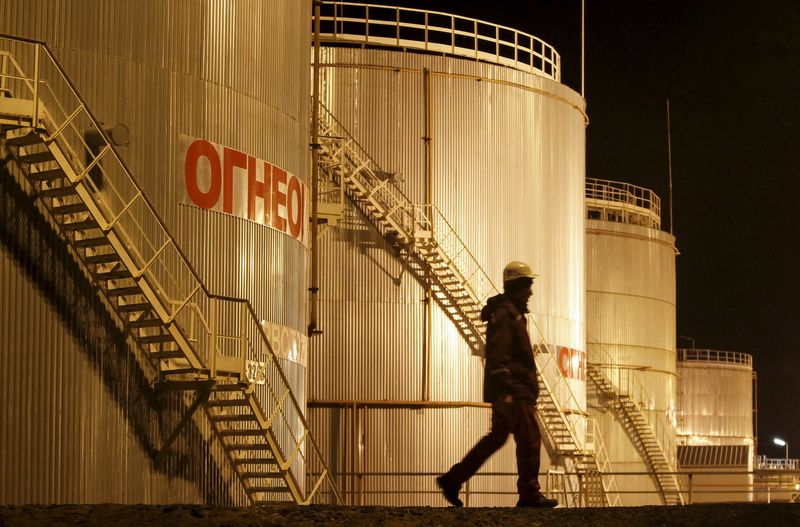Oil Slides as China’s Covid Puts EU-Russia on Back Burner By Investing.com
[ad_1]
 © Reuters.
© Reuters. By Barani Krishnan
Investing.com — Deja vu of a 2020 China in lockdown is weighing on oil, even as the EU-Russia face-off over Ukraine suggests crude prices have little way to go but up.
Oil’s global benchmark Brent and U.S. crude’s West Texas Intermediate, or WTI, benchmark settled down on Friday, logging a third weekly loss in four, on the prospect of weaker global growth, higher interest rates and Covid clampdowns in China’s financial hub Shanghai.
London-traded settled down $1.68, or 1.6%, at $106.65 per barrel. For the week, Brent showed a 4.5% loss that came after a near 9% gain last week and the 13% drop in two prior weeks. If the declines keep up, April will be the first month in the negative this year for Brent.
New York-traded settled down $1.72, or 1.7%, at $102.07. Like Brent, WTI showed a drop of 4.5% for the week, and similar volatility to the U.K. benchmark in three previous weeks.
“The risks are certainly more tilted to the upside, given the war in Ukraine and a potential embargo on Russian exports, but lockdowns in China and the risk of a Fed-driven economic slowdown are also significant,” said Craig Erlam, head of research for Europe at online trading platform OANDA.
Bloomberg reported that China’s demand for gasoline, diesel and aviation fuel in April is expected to slide 20% from a year earlier, according to people with inside knowledge of the country’s energy industry.
That would be equivalent to a drop in crude oil consumption of 1.2 million barrels a day, they said, and will be the largest hit to demand since the lockdown more than two years ago in Wuhan — the central Chinese city where Covid-19 was first identified.
Federal Reserve Chairman Jerome Powell also spooked markets with hawkish talk at the IMF/World Bank Spring meetings this week. Powell said it would be “appropriate” for the central bank to move faster and heavier on interest rates — a strong sign that the Fed’s rate decision committee would approve a half point rise at its upcoming May 4-5 meeting after a previous hike of just a quarter point in March.
“Some fear that a 50 basis point rate increase will be the first of many and could slow down the economy and the demand for oil,” Phil Flynn, energy analyst at Price Futures Group in Chicago, wrote in a commentary.
“It is not just a tightening cycle upsetting traders overnight but also the pricing in of a 50-basis point interest rate increase by September by the European Central Bank. The Bank of Japan on the other hand wants to remain dovish but worries that the course of the U.S. and Europe could force them to change course.”
German — the largest economy in Europe — will cut its growth forecast for 2022 to 2.2% from 3.6%, a government source told Reuters this week.
[ad_2]
Source link
 © Reuters.
© Reuters. By Barani Krishnan
Investing.com — Deja vu of a 2020 China in lockdown is weighing on oil, even as the EU-Russia face-off over Ukraine suggests crude prices have little way to go but up.
Oil’s global benchmark Brent and U.S. crude’s West Texas Intermediate, or WTI, benchmark settled down on Friday, logging a third weekly loss in four, on the prospect of weaker global growth, higher interest rates and Covid clampdowns in China’s financial hub Shanghai.
London-traded settled down $1.68, or 1.6%, at $106.65 per barrel. For the week, Brent showed a 4.5% loss that came after a near 9% gain last week and the 13% drop in two prior weeks. If the declines keep up, April will be the first month in the negative this year for Brent.
New York-traded settled down $1.72, or 1.7%, at $102.07. Like Brent, WTI showed a drop of 4.5% for the week, and similar volatility to the U.K. benchmark in three previous weeks.
“The risks are certainly more tilted to the upside, given the war in Ukraine and a potential embargo on Russian exports, but lockdowns in China and the risk of a Fed-driven economic slowdown are also significant,” said Craig Erlam, head of research for Europe at online trading platform OANDA.
Bloomberg reported that China’s demand for gasoline, diesel and aviation fuel in April is expected to slide 20% from a year earlier, according to people with inside knowledge of the country’s energy industry.
That would be equivalent to a drop in crude oil consumption of 1.2 million barrels a day, they said, and will be the largest hit to demand since the lockdown more than two years ago in Wuhan — the central Chinese city where Covid-19 was first identified.
Federal Reserve Chairman Jerome Powell also spooked markets with hawkish talk at the IMF/World Bank Spring meetings this week. Powell said it would be “appropriate” for the central bank to move faster and heavier on interest rates — a strong sign that the Fed’s rate decision committee would approve a half point rise at its upcoming May 4-5 meeting after a previous hike of just a quarter point in March.
“Some fear that a 50 basis point rate increase will be the first of many and could slow down the economy and the demand for oil,” Phil Flynn, energy analyst at Price Futures Group in Chicago, wrote in a commentary.
“It is not just a tightening cycle upsetting traders overnight but also the pricing in of a 50-basis point interest rate increase by September by the European Central Bank. The Bank of Japan on the other hand wants to remain dovish but worries that the course of the U.S. and Europe could force them to change course.”
German — the largest economy in Europe — will cut its growth forecast for 2022 to 2.2% from 3.6%, a government source told Reuters this week.